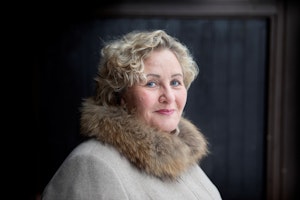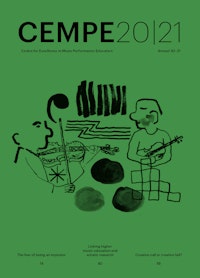- A stimulating learning and working environment is a fundamental prerequisite if the NMH is going to be an attractive choice for studying and working. We want to develop meeting places to ensure increased interaction, to have a culture of openness that stimulates curiosity, and to have a low threshold for trying out new things. There must be a good information flow and transparent decision-making processes so the staff and students feel a sense of ownership and belonging. Good academic leadership is essential, and a constructive psychosocial climate is necessary. Involvement and inclusivity will be in the driver’s seat, competence development will be a focus area, and we will strengthen our work on the development of the campus. A green NMH will contribute to a sustainable music branch.
- A strong, unified and well-functioning organisation is vital in being able to offer high-quality education and research. Integrated and long-range work will help to convert appropriations into good teaching and research in an efficient manner. The management team must be available and prepared to listen in a way that promotes participation and co-determination. Well-being will be built up, and we will work to establish secure and motivating working conditions.
- The music discipline must be our main focus, and we will promote music and art within and outside of the NMH. It is essential to secure outstanding teaching and quality in the courses, and the theme of health in music is an important part of this. Communication must assume a broader role in teaching and research, and we will strengthen and continue to develop artistic and scientific R&D. We will provide motivation for upgrades, promotions and academic-pedagogical development work.
Election 2021: Candidate for Principal, Lisbeth Wathne Svinø, Answers Questions

Lisbeth Wathne Svinø and Julius Pranevicius are candidates for Principal and Deputy Principal. What are their standpoints?
What are the three most important issues you want to work with in the future?
What does diversity mean at the Norwegian Academy of Music?
Through our differences we complement each other. A high degree of diversity and equality contribute to more innovation and creativity and to better problem solving, the cornerstones of a strong institution. Regardless of gender, ethnicity, cultural background, religion, disability or sexual orientation, the NMH should be a good place for everyone to study and work.
Diversity means that
- the management team supports and encourages the Committee for Diversity and Equality by working actively in this area to make it visible in a variety of arenas
- we have a long-term plan for how the NMH will take various needs into consideration
- our recruitment procedures ensure that we have as diverse representation as possible in all programmes of study. This work is carried out in collaboration with, among others, the talent programme and other arts education institutions
- everyone who works for the NMH has equal opportunities to build a career, regardless of whether their tasks pertain to artistic, administrative or research areas
- we have safe and predictable working conditions for everyone. The majority of our colleagues with artistic competence are engaged in permanent positions, like most other staff members at the NMH
- wage and personnel policies are thoroughly thought through in order to ensure broad recruitment to positions at the institution
- we help to strengthen the standing of artistic expertise within the community, so young people can choose music as a safe career path
- we work with genre-specific challenges to ensure an equal gender balance within various disciplines and programme options, and in the activities of juries and examiners
How should the NMH define its profile when the music community is constantly changing?
To address change, the NMH will
- have a profile as an active co-creator for tomorrow, and as a driving force in the musical life of Norway, offering work characterised by high quality, professional innovation and relevance to the community
- offer a relevant and future-oriented range of studies with a strong connection between programmes and future working life, so students are equipped with what they will need
- maintain a size that is in keeping with the needs of society
- have an orderly, predictable economy, which is necessary for carrying out quality assurance of the school’s academic profile and desired level of activity
- ensure lifelong learning within the field of music by developing several targeted goals within continuing and further education
- ensure future recruitment and diverse representation within all programmes of study by collaborating with talent development programmes and with other institutes of higher learning in the arts
- develop digital competence and a solid digital infrastructure with appropriate solutions, while at the same time digitalisation is addressed with a reflective and nuanced point of view
- develop a green profile as the beginning of our contribution to a robust and sustainable music sector. The NMH will be in the forefront of the efforts to create a music sector that focuses on diversity and equality
- promote music in cultural policy connections in order to help establish good framework conditions for the sector
- collaborate with several educational institutions within the arts in order to contribute to increased interdisciplinary competence
- communicate with various target groups through existing and new platforms
- concentrate on the renewal of the school’s academic profile through competence building and R&D, while at the same time safeguarding traditions
"It is also a good feeling to be able to contribute in a positive way to an institution that means a great deal to me personally".
Wathne Svinø

Lisbeth about the management team and why she is running for the office of Principal

Julius and his ambitions as Deputy Principal
I am especially interested in three areas: instruction on the main instrument, artistic and pedagogical R&D and musician health. These are areas where I have a great deal of insight because they are directly connected to my activities as an instrumental teacher. In order to strengthen and further develop these areas, I will collaborate with colleagues and students. These areas are complex and they overlap on several levels, and I want to contribute to a common understanding of methods for further development so we can offer the best possible quality in the study programmes.
"The reason I came to Norway from Lithuania was, simply, Frøydis Ree Wekre".
Pranevicius

What kind of music do you listen to secretly?
Lisbeth: There is a song I use at the end of tough training sessions and as motivation to stay up to speed when going up steep hills – a Swedish Melody Grand Prix song from 2020: “Move” with The Mamas. Three fantastic gospel voices that pack a wallop!
Julius: In addition to my nerdy interest in large horn ensembles, I have listened to “Wrecking Ball” with Miley Cyrus a few times, to be honest.

Election 2021: Information site
You can read about how the election will be carried out, who has the right to wote, etc.
Go to the information site


